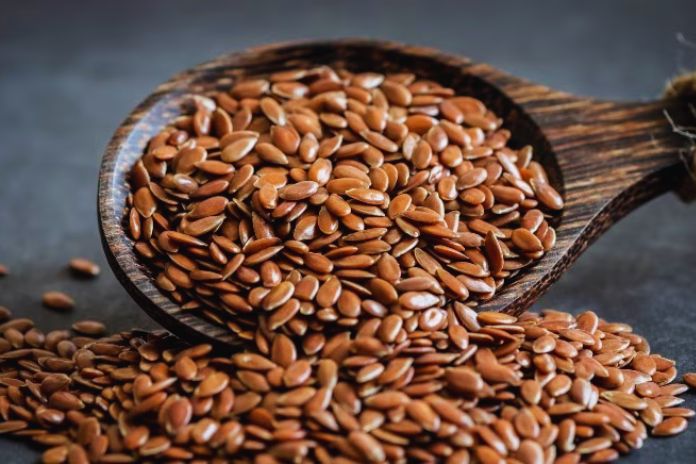Brown or golden, with a nutty flavor, and gluten-free, these little oilseeds are all hidden powers. Find out in this article the benefits of flax seeds so you can include them in your plate!
Nutritional Profile
Flax produces tiny seeds that can be sprinkled on dishes after being ground or crushed to access nutrients and bioactive compounds.
Plant Fibers And Proteins
Flax seeds (Linum usitatissimum) have a fascinating nutritional profile. In terms of macronutrients, they are a source of vegetable proteins with a content of around 20%. Although they contain 30% carbohydrates, these are found almost exclusively in fiber. They, therefore, have a low glycemic index of only 35. The most remarkable point, however, lies in their lipid composition.
Omega 3
Flaxseeds are oilseed in nature, made up of approximately 40% lipids. They can, therefore, be used to produce oil. They are rich in alpha-linolenic acid (ALA), constituting more than half of the fat stock. This polyunsaturated fatty acid belongs to the omega-3 family, often lacking in modern diets. Flaxseeds are the most concentrated source of ALA, containing five times more than rapeseeds, known for their content of this compound. Like crushed seeds, linseed oil is particularly fragile due to its omega-3 content and must therefore be kept cool.
Omega-3/Omega-6 Ratio
ALA is an essential fatty acid because our body cannot produce it independently. It is a precursor to forming eicosapentaenoic acid (EPA) and docosahexaenoic acid (DHA), two other omega-3s valuable to the body. The conversion is, however, not very efficient; the consumption of foods containing ALA does not allow us to avoid external intakes of EPA and DHA, mainly found in fatty fish. Flaxseed also contains 20% oleic acid, a monounsaturated fatty acid, 17% linoleic acid, an omega-6, and tiny saturated fatty acids. The ratio between the quantity of omega-3 and omega-6 is thus mainly in favor of the former, which gives these seeds solid benefits for health.
Minerals And Trace Elements
Flax seeds provide significant minerals such as potassium, copper, phosphorus, manganese, selenium and zinc. A tablespoon of flaxseed offers the same amount of magnesium as a banana, almost 40 mg.
Vitamins B And E
Flaxseeds are rich in thiamine, or vitamin B1, with a content of 1.64 mg per 100 g. This vitamin supports many processes in the body; it is involved in energy metabolism and contributes to the proper functioning of the heart and the maintenance of intellectual abilities. Flaxseeds also provide vitamin B6 and folate. They are also rich in γ-tocopherol, one of the forms of vitamin E, since they contain almost 20 mg per 100 g. Vitamin E has antioxidant properties.
Phytoestrogens
In addition to nutrients, flax seeds are also equipped with molecules of interest, lignans. The chemical structure of these phenolic compounds is close to the female hormone estrogens. The main lignan, representing over 95% of the total stock, is secoisolariciresinol-diglucoside (SDG). Flax seeds contain 75 to 800 times more than other edible plant species. Once in the colon, this lignan is transformed into active molecules with antioxidant and anti-cancer properties under the effect of bacteria in the intestinal microbiota.
Cardiovascular And Metabolic Benefits
Flaxseeds exert beneficial activity for cardiovascular and metabolic health thanks to their content of omega-3, lignans and fiber. Studies conducted in population samples have demonstrated the protective effects of high ALA consumption on the risk of death from cardiac causes of coronary heart disease. These moderate inflammatory phenomena in the body are conducive to the onset of chronic diseases.
Atherosclerosis Prevention
Low-grade inflammation notably promotes the development of atherosclerosis. In this situation, atherosclerotic plaques form in the walls of blood vessels, hindering blood circulation and increasing the risk of cardiovascular events. Consumption of flaxseed could play a protective role by reducing blood levels of lipoprotein Lp(a), a compound that promotes this process. It improves the blood lipid profile, allowing, in particular, to lower the concentration of triglycerides. These benefits are obtained with daily quantities of 30 to 40 g of flax seeds throughout 30 to 40 days.
Effects Against Hypertension
Flax seeds’ favorable effects on cardiovascular health include their ability to fight high blood pressure. A meta-analysis highlighted a modest drop in blood pressure of 2 mmHg linked to their consumption. However, the studies reviewed in this analysis mainly included people without hypertension.
The effects are more pronounced in people with hypertension, as shown in a study of people with peripheral artery disease, a condition that frequently coexists with hypertension. The 110 participants consumed 30 g of ground flaxseed or a placebo daily for six months. In the flaxseed group, hypertensive participants experienced a reduction of 7 mmHg in diastolic blood pressure and 15 mmHg in systolic blood pressure.
Blood Sugar Control
Flax seeds also improve sugar metabolism within the body. Their richness in soluble fiber makes it possible to slow down their absorption in the digestive tract, limiting the increase in blood sugar and insulin secretion after a meal. In addition, the fiber contained in flax seeds is fermented by intestinal bacteria and allows the production of short-chain fatty acids (SCFA). Among their multiple benefits, SCFAs improve insulin sensitivity.
A Tablespoon In Case Of Diabetes
The effects of consuming 10 g of flaxseed daily were evaluated in people with type 2 diabetes. This approach carried out over 12 weeks, led to a reduction in fasting blood sugar of 26.7 mg/dL. , compared to 1.9 mg/dL in the placebo group. A study conducted on overweight men and postmenopausal women with prediabetes showed that a dose of 13 g was more effective than a dose of 26 g.
An analysis that compiled the results of 25 clinical trials confirmed the effectiveness of flax seeds on blood sugar control, but only in their raw form. Linseed oil or lignans do not produce effects in this context. Consumption over a sufficient period of more than three months is necessary to benefit from an improvement in the body’s sensitivity to insulin.
Effects On Well-Being
The benefit of integrating flax seeds into your diet concerns many other aspects of well-being and health.
Weight Control
Flaxseed could help maintain a healthy weight. In a Danish study of 44 volunteers, consuming flax seeds containing 2.5 g of soluble fiber increased the feeling of fullness. As a result, the quantity of calories consumed during the day decreased: it represented 2937 kJ on average compared to 3214 kJ without supplementation. The effects can quickly be felt on the silhouette.
Researchers who analyzed the results of 45 clinical trials concluded that consuming flaxseed effectively reduced participants’ weight, body mass index and waist circumference. The slimming is all the more marked with large doses, greater than 30 g per day, taken over more than 12 weeks and in people whose BMI initially exceeds 27.
Improvement In Constipation
Insoluble fiber in flaxseed can relieve constipation because fiber increases stool bulk and stimulates intestinal contractions, reducing transit time. This benefit against constipation has been demonstrated during several clinical trials with whole seeds or flaxseed oil. The approach appears even more effective than psyllium, a natural product recommended in cases of constipation.
Benefits Against Inflammatory Bowel Disease (IBD)
The anti-inflammatory properties of flax seeds could help relieve the symptoms experienced in chronic inflammatory bowel disease cases. A study on 90 patients with ulcerative colitis evaluated the benefits of taking 30 g of flax seeds daily and 10 g of flaxseed oil against a placebo. In both groups that benefited from flax, inflammation levels and disease severity were reduced.
Effects On Skin Health
Flaxseed supplementation acts at the skin level. A study highlighted its ability to reduce skin sensitivity and improve its texture and degree of hydration. The healing properties of lignans are the subject of studies; they can facilitate wound healing by stimulating collagen production.
Relieve The Signs Of Menopause
In women during their reproductive years, lignans oppose the action of estrogens. On the other hand, when the level of these sex hormones falls in the body at the time of menopause, they partly replace their action. They then behave like low-activity estrogens . Iranian researchers have demonstrated a reduction in the severity and duration of hot flashes, the intensity of night sweating episodes and sleep disorders thanks to consuming 40 g of flax seeds per day for six weeks. Flaxseed also tends to lower the amount of steroidal sex hormones involved in the development of breast cancer in postmenopausal women suffering from obesity.
Anti-Cancer Action
Compounds from lignans bind to cellular estrogen receptors and slow cell growth. They can thus combat the unchecked development of cells, a phenomenon observed in cancer cases. Work carried out in the laboratory, on cell cultures and in animals, has shown the ability of flax lignans to fight colon, lung, skin and blood cancer.
Against Breast Cancer
The effects of flax seeds have been mainly studied in the context of breast cancer. Observational studies have established a relationship between consuming around 30g of flaxseed daily and a reduced risk of developing this disease. Canadian researchers conducted a study to determine if supplementing with flaxseed could slow tumor development in women with breast cancer.
The participants consumed 25 g of flax seeds per day or a placebo for around thirty days. Analyzes revealed a reduction in the speed of cell proliferation and the level of expression of an oncogene involved in the disease thanks to flax seeds. They also made it possible to increase the phenomena of apoptosis which lead to the destruction of cancer cells.
The specific interest of lignans has also been highlighted. In women at high risk of developing breast cancer, administration of 50 mg per day of SDG for one year was able to reduce cell proliferation. The survival of patients is also prolonged when their blood concentration and dietary lignan intake are high.
Prostate Hyperplasia
Benign prostatic hypertrophy is linked to excessive cell multiplication. If it is not cancerous, it can cause urinary problems due to compression of the urinary canal. Flax lignans can improve the situation of men affected by this situation. The administration of an extract of lignans from flax for four months alleviates urinary difficulties, more markedly with increasing dosages, and improves quality of life. These effects are comparable to those obtained by taking medications commonly used in this context.
The Dangers Of Flax Seeds
Flaxseeds contain substances that could reduce the assimilation of essential nutrients. These include inhibitors of enzymes responsible for protein digestion or phytates, which limit the absorption of calcium, zinc, magnesium, copper and iron. They also contain linatine, a compound which opposes the action of vitamin B6 and causes deficiency symptoms in certain animals.
This effect has never been observed in humans. Flax seeds also contain cyanogenic glycosides. But a man would have to consume around 1 kg per day to be exposed to the toxicity of the cyanide that emanates from it. In conclusion, flaxseeds are superfoods that provide reasonable omega-3, fiber, phytoestrogens and magnesium. They help prevent cardiovascular diseases, fight constipation and control weight. Proper consumption does not present any danger to health.
Read Also: Whole Eggs: They Could Improve Heart Health




